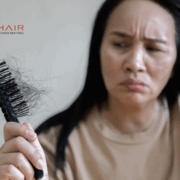Women’s Hair Loss Causes in Nolensville, TN
Expert solutions for women’s hair loss. Discover the root cause.
Hair loss is a prevalent concern among women, affecting individuals of all ages and backgrounds. While men are commonly associated with balding, the truth is that women also experience hair loss, and it can be utterly distressing. Understanding the causes of women’s hair loss is crucial in addressing and managing this issue. In this comprehensive guide, we will delve into the various factors contributing to women’s hair loss, providing valuable insights for those seeking to comprehend and combat this condition.
Hormonal Imbalance and Hair Loss
Hormonal imbalance is a leading cause of hair loss in women. Fluctuations in hormone levels, particularly during pregnancy, menopause, and the menstrual cycle, can result in thinning of hair or significant shedding. The hormone dihydrotestosterone (DHT) is a known contributor to hair loss, as it can shrink hair follicles, leading to shorter and finer hair growth. Additionally, conditions such as polycystic ovary syndrome (PCOS) can lead to increased androgen levels, which may trigger hair loss in affected individuals.
Stress and Hair Loss
Chronic stress can have a profound impact on the body, including the potential for hair loss. The physiological response to stress can disrupt the normal hair growth cycle, pushing more hair follicles into the shedding phase. This condition, known as telogen effluvium, can lead to noticeable hair thinning and shedding. Addressing stress through relaxation techniques, mindfulness, and seeking professional support can play a pivotal role in mitigating the effects of stress-related hair loss.
Nutritional Deficiencies and Hair Loss
The body’s nutritional status has a direct correlation with the health of hair. Inadequate intake of essential nutrients such as iron, protein, and certain vitamins can manifest as brittle, weak, and thinning hair. Iron deficiency, in particular, is known for its association with hair loss. Ensuring a well-balanced diet rich in essential nutrients is fundamental in supporting healthy hair growth and preventing potential deficiencies that can contribute to hair loss.
Medical Conditions and Hair Loss
Several medical conditions can lead to hair loss in women. Autoimmune disorders like alopecia areata can result in sudden hair loss, often in distinct patches. Thyroid disorders, such as hypothyroidism or hyperthyroidism, can also impact the hair growth cycle, leading to thinning or loss of hair. Consulting with a healthcare professional to address underlying medical issues is crucial in managing hair loss associated with these conditions.
Genetics and Hair Loss
Genetic predisposition plays a significant role in hair loss among women. Female pattern hair loss, also known as androgenetic alopecia, is influenced by genetic factors and can lead to progressive thinning of hair over time. Understanding one’s family history of hair loss can provide valuable insights into the potential risk of developing similar patterns of hair loss and guide proactive measures to manage the condition.
End thoughts
Knowing the various causes of women’s hair loss is essential in devising tailored approaches to address this concern. By comprehensively exploring the impact of hormonal imbalance, stress, nutritional deficiencies, medical conditions, and genetic factors, individuals can gain valuable insights into the root causes of hair loss and explore targeted solutions for managing this issue. Empowering women with knowledge and tailored support is crucial in addressing hair loss and fostering confidence and well-being.












